人教版高中英语必修四unit4 Body language Reading 课件(共54张)
文档属性
| 名称 | 人教版高中英语必修四unit4 Body language Reading 课件(共54张) |  | |
| 格式 | zip | ||
| 文件大小 | 1.6MB | ||
| 资源类型 | 教案 | ||
| 版本资源 | 人教版(新课程标准) | ||
| 科目 | 英语 | ||
| 更新时间 | 2019-04-16 16:57:06 | ||
图片预览

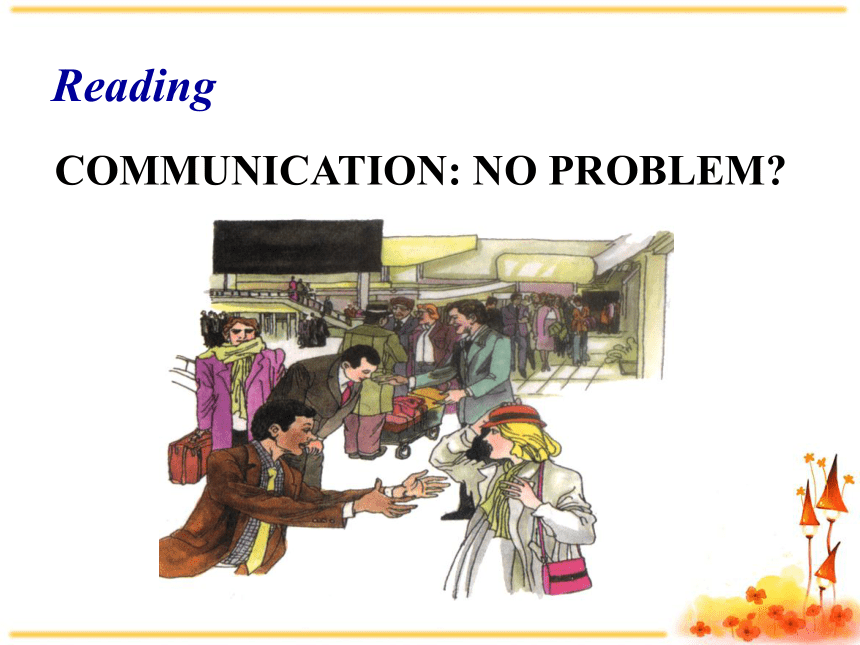
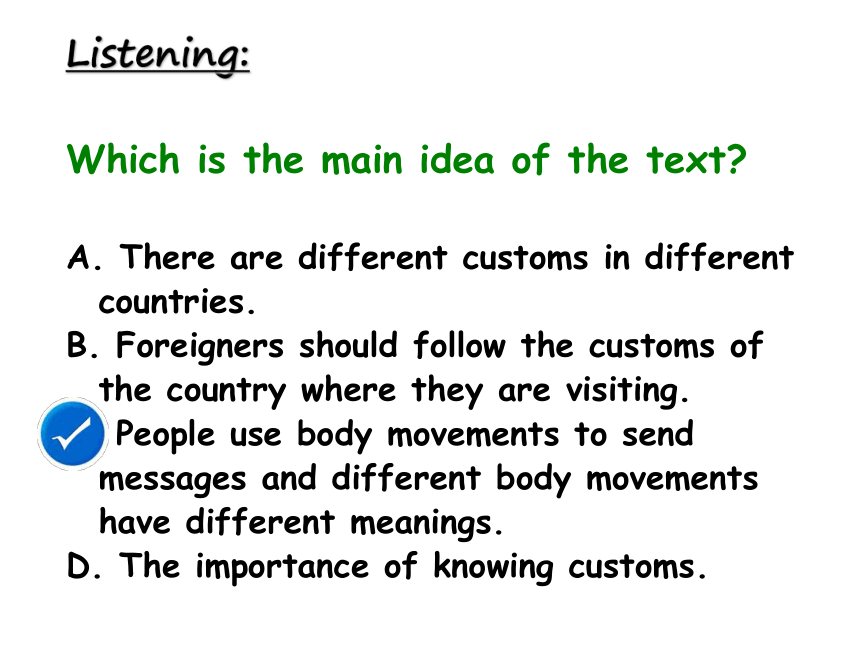

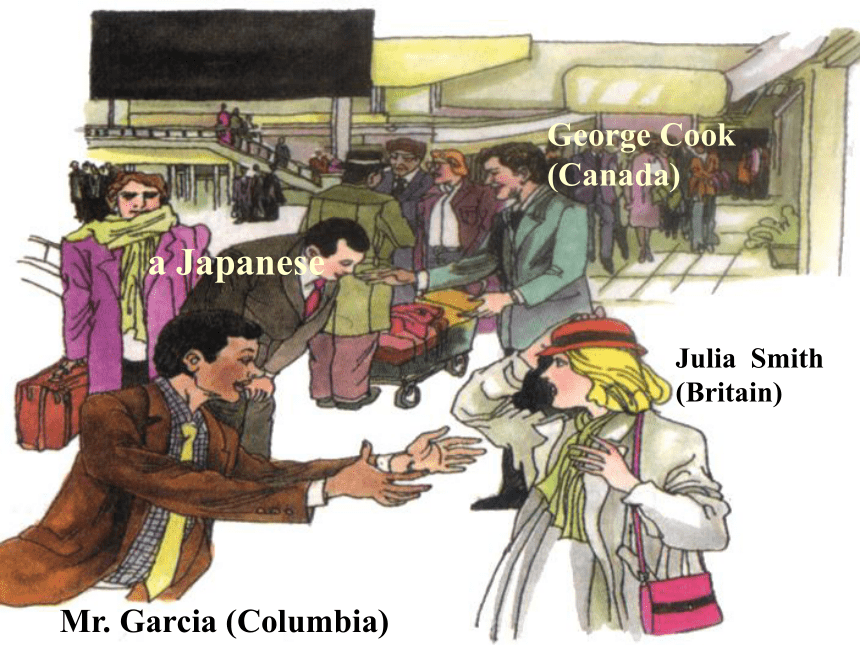

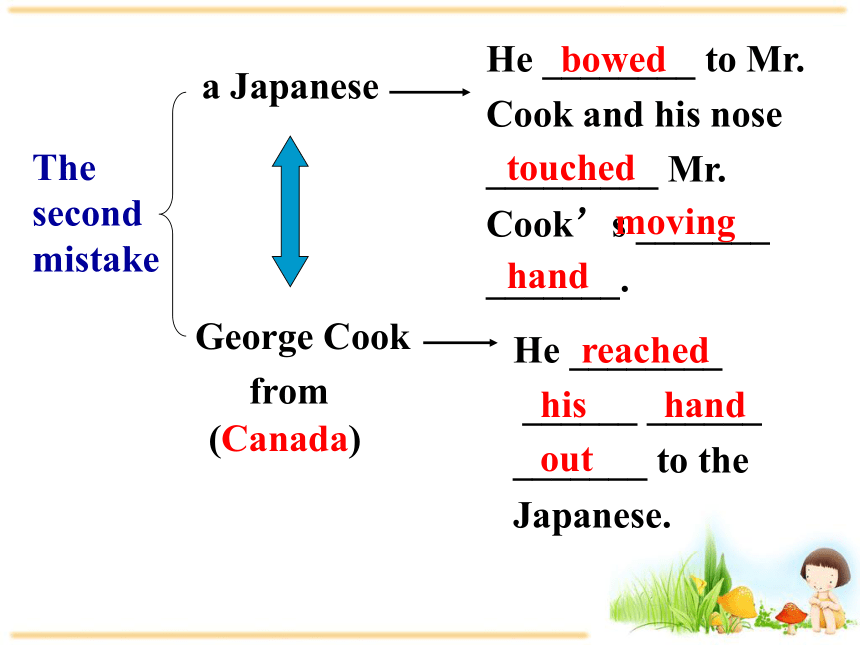
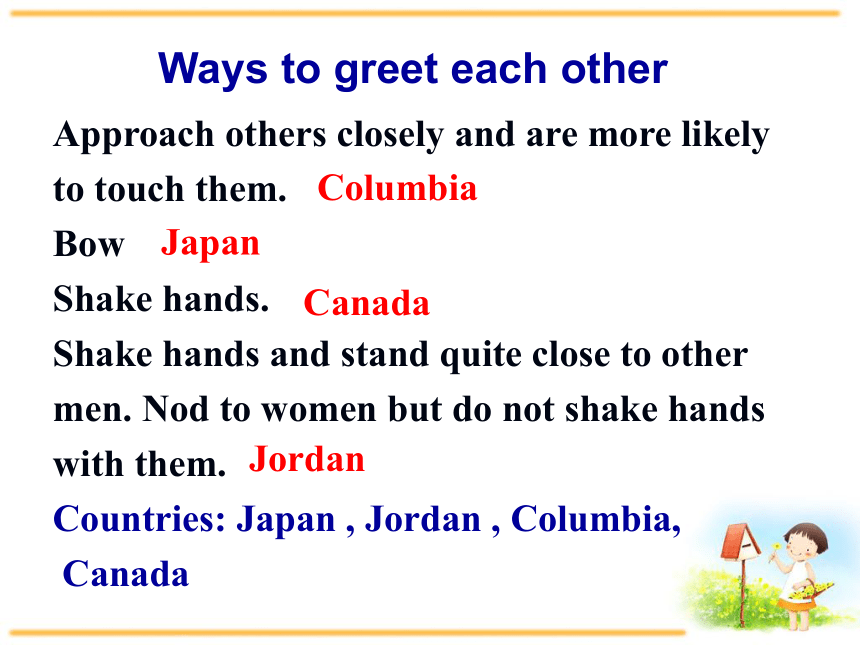

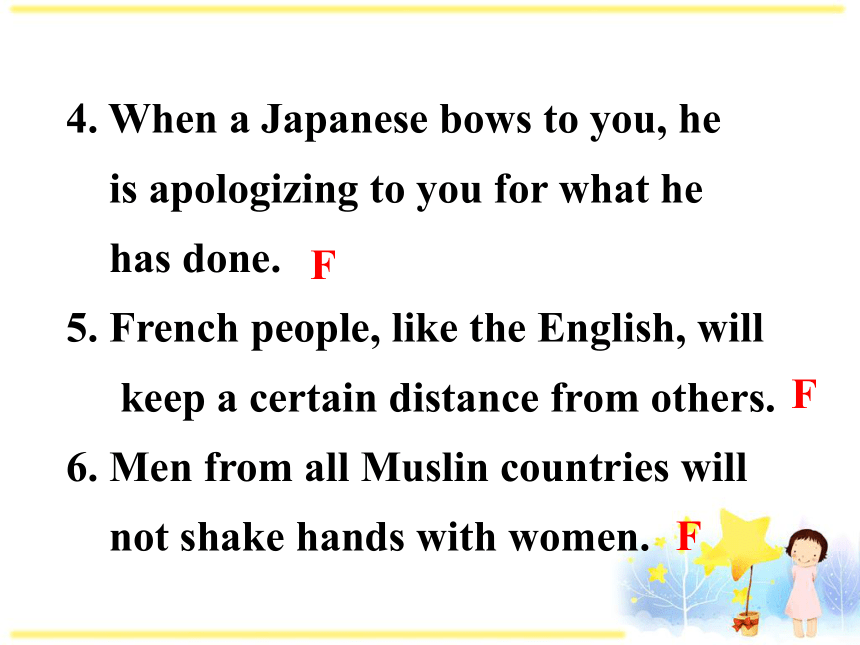
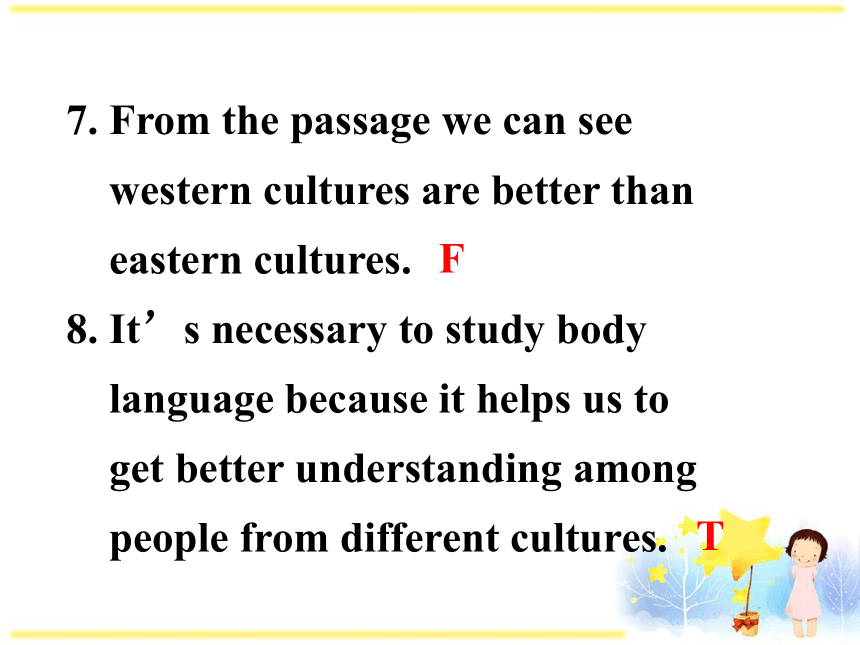
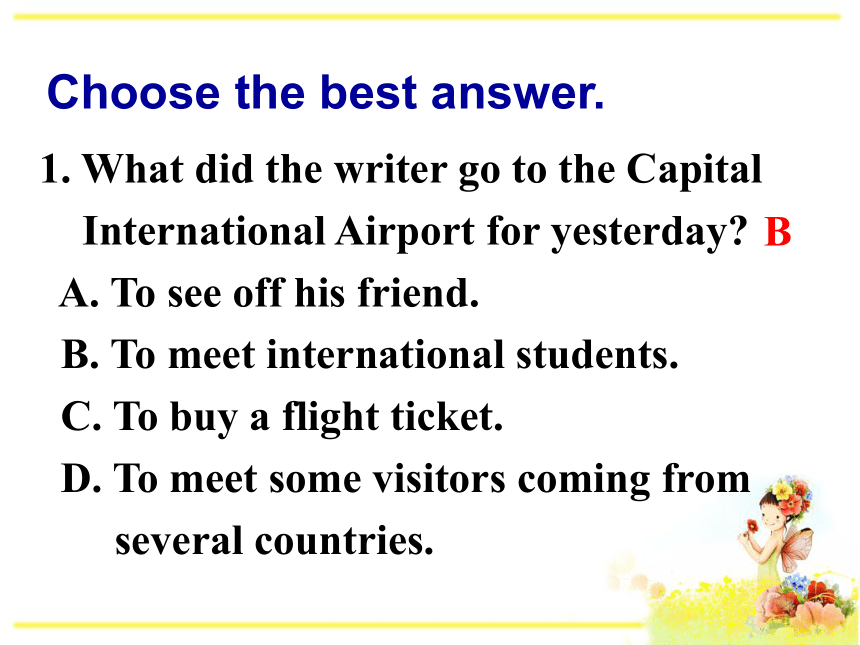
文档简介
课件54张PPT。Unit 4
Body language
Reading ReadingCOMMUNICATION: NO PROBLEM?Which is the main idea of the text?
A. There are different customs in different countries.
B. Foreigners should follow the customs of the country where they are visiting.
C. People use body movements to send messages and different body movements have different meanings.
D. The importance of knowing customs. Listening: Fast reading: find the characters and where they are from?Julia SmithColumbiaCanadaAhmed AzizFranceChina Mr. Garcia (Columbia)Julia Smith (Britain)George Cook (Canada)a JapaneseFind out the two mistakes. Mr. Garcia Julia SmithThe first mistakefromfrom(Columbia)(Britain)He approaches Ms
Smith by _______ ____
_________ and ______
her on the ________.She _______ ______
appearing _________
and take a few steps
_______ ______ Mr.
Garcia.shouldertouchingherkissedcheekstepped backsurprisedaway fromCareful
ReadingThe second mistakea JapaneseGeorge Cookfrom(Canada)He ________
______ ______
_______ to the
Japanese.He ________ to Mr.
Cook and his nose
_________ Mr.
Cook’s _______
_______.bowedtouchedmovinghandreached his handoutApproach others closely and are more likely
to touch them.
Bow
Shake hands.
Shake hands and stand quite close to other
men. Nod to women but do not shake hands
with them.
Countries: Japan , Jordan , Columbia,
CanadaColumbiaJapanCanadaJordanWays to greet each other1. Mr. Garcia kissed Miss Julia Smith
because they have known each other
well.
2. George Cook reaches his hand out
in order to shake hands with the
Japanese.
3. All cultures don’t greet each the
same way.F True or false?TT 4. When a Japanese bows to you, he
is apologizing to you for what he
has done.
5. French people, like the English, will
keep a certain distance from others.
6. Men from all Muslin countries will
not shake hands with women. F FF 7. From the passage we can see
western cultures are better than
eastern cultures.
8. It’s necessary to study body
language because it helps us to
get better understanding among
people from different cultures. FT 1. What did the writer go to the Capital
International Airport for yesterday?
A. To see off his friend.
B. To meet international students.
C. To buy a flight ticket.
D. To meet some visitors coming from
several countries. BChoose the best answer.2. Where is Tony Garcia from?
A. Britain. B. Japan.
C. Colombia. D. Canada.
3. From Paragraph 2 we know that
Japanese prefer to ____ when they
are introduced to others.
A. bow B. shake hands
C. kiss each other
D. touch others’ shoulders CA4. According to the text, men from the
Middle East often ____.
A. nod heads and wave hands to girls
B. touch others’ heads when they first
meet
C. kiss each other twice on each cheek
when they are introduced to others
D. stand quite close to other men when
they talkD1. Why are the international students
coming to China?They are coming to China to study
at Beijing University.Answer the questions.2. Why is Julia Smith surprised?
3. Why did the author move back from
Ahmed Aziz?Julia Smith is surprised that Mr Garcia touches her shoulder and kisses on the cheek when they meet.The author moved back because he
comes too close to talk to the author.4. What do French people often do
when they meet people they know?They shake hands & kiss each
other twice on each cheek.5. Can we expect people everywhere
to act the same? Why? No. Because people from different
culture or countries act quite
differently sometimes.6. Is the author of this passage male or
female? How do you know?The author is male. Ahmed Aziz will
not shake hands with women, but he
shakes with the author.7. “ When in Rome, do as the Romans
do.” What do you think this famous
saying means?This saying means that when we are in
a certain place, we should follow the
customs of the people who live in that
place, not our own customs.8. Why do you think we need to study
body language?It is quite necessary for us to study
body language if we don’t want to
cause any misunderstanding in
communication /so that we don’t
misunderstand each other.Language PointsYesterday, another student and I, representing
our university’s student association, went to the
Capital International Airport to meet this year’s
international students.
昨天, 我和另一个学生代表我们学生会,
到首都国际机场迎接今年的国际学生。
1) represent 动词, “代表” 如:To be chosen to represent their country is the
highest honor for most athletes.
能被选拔出来代表国家参赛, 是多数运动员
的最高荣誉。
I know who you are and whom you represent.
我知道你是谁并代表谁。
【拓展】
representation n. 代表; 表现; 描写
representative adj.有代表性的; 典型的用represent的适当形式完成下列句子。
He was picked out from the whole class
to _________ them at the other school.
This painting is a _____________ of a
storm at sea.
Is a questionnaire answered by 500
people truly _____________ of national
opinion?representrepresentationrepresentative 2) association 名词, 表示“协会; 社团;
学会”, “联合; 交往”。如:
Do you belong to any professional
association?
你属于哪个专业学会?
He is a member of the Association of
University Teachers.
他是大学教师联合会的一名成员。 His English improved enormously because of his association with British people. 因为他和英国人有来往, 所以他的英语突飞猛进。
【拓展】
associate v.
把……联系起来; 由……联想到
in association with
与……联合; 与……有关联 We are working in association with a number
of local companies to raise money for the
homeless.
There has always been a close association
between these two schools. 我们与本地一些公司联合为无家可归
的人筹款。这两所学校一向有密切联系。英译汉She associated happiness with
having money.
I don’t want to associate myself
with them any more. 她把幸福和有钱联想到一起。我不愿再和他们交往了。 2. I saw several young people enter the
waiting area looking around curiously.
我看见几个年轻人走进了等候区, 好奇地向
四处张望。
curious adj. 好奇的; 有求知欲的; 奇怪的
curiosity n. 好奇心
out of curiosity 出于好奇
be curious about sth 对某事感到好奇
be curious to do sth 很想做某事; 渴望做某事As a little girl, she was curious about the
origin of human beings.
The tourists were surrounded by the
curious children.
用curious的适当形式完成下列句子。
I am ________ about what has happened.
A deer behind the tree looked at us
__________.
She has burning _________ to know
what’s going on.
They were ________ to know where he
had gone.curious curiouslycuriositycurious3. After I met them …introduced them to each
other, … Tony approached Julia, touched her
shoulder and kissed her on the cheek.verb + sb. in/ on/ by + the 身体部位
1) approach n. 靠近; 临近; 接近
The enemy ran away at our approach.
在我们接近时, 敌人跑了。
We heard the approach of the train.
我们听见火车开过来了。 n. 方法; 步骤; 通路; 通道
The approach to the house was a narrow path.
通往这房子的路是一条狭窄的小径。
The best approach to learn a foreign language
is the study of the spoken language.
学习外语的最好的途径是学口语。
at the approach of winter 冬季将临的时候
be easy of approach 容易到达; 容易接近
on the approach of death 临死的时候v. 走近; 靠近; 接近
You must approach the bird very quietly or it
will fly away.
你必须悄悄地走近那只鸟, 否则它会飞走的。
The summer is approaching. 夏季即将来临。
approach sb. about sth. 为某事同某人打交道
approach sb. for information 向某人了解情况
approach sb. with a suggestion 向某人建议
2) touch
vt. 触摸, 接触, 触及, 轻触
I told you not to touch my things.
touch sb./ sth. (with sth.)
感动(某人)触动某人(某人的感情)
Her miserable experience touched us
all deeply / touched our hearts with sorrow.
她经历很不幸, 我们深受感动 / 我们都很伤心。 n. 接触, 联系
get / keep in touch with sb.
与……取得/保持联系
be in/ out of ~ (with sb.)
与……有/无联系
We’ve been out of touch for years.4. introduce sb. to sb.
把某人介绍给某人
introduce sth. into… 采用; 引进Please allow me to introduce Mr Smith.
Potatoes were first introduced into Europe
from South America.introduction n.
a letter of ~ 介绍信
make a self-introduction 作自我介绍
make ~ to each other 互相介绍
Yao Ming is a person needs no ~. 5. apologize v. 道歉, 认错
apologize to sb. for sth. / doing sth.
He apologized to her for not going to her
party. 他因为没有出席她举行的宴会而
向她表示歉意。
apology n.
make an apology to sb. for (doing) sth.
accept / refuse an apologynot … nor 既不……又不……
not all 连用形成部分否定6. Not all cultures greet each other the same
way, nor are they comfortable in the same way
with touching or distance between people.
各种文化背景下的人相互问候的方式不尽相同,
身体接触和相互间距的程度也不尽相同。nor / neither 否定副词, 常置于句首,
此时句子要倒装, 即助动词/系动词/
情态动词放在主语之前。
I don’t like her, nor/neither does Lily.
I am not a nurse, nor/ neither is Lily.
nor = and also not / neither
方式状语= while they are touching…
or being…7. In the same way that people
communicate with spoken language, they
also express their feelings using unspoken
“language” through keeping physical
distance, actions or posture.1) that引导的是方式定语从句。
The way that/ in which/或不用关联词。2) using引导的是状语, v-ing做状语。3)express vt. (用语言, 神色, 动作等)表达,
表示(感情, 意见)
express sth. (to sb.)
The guests express their thanks before leaving.
你对我的帮助, 我感激不尽。
I can’t express to you how grateful I am for
your help.
express oneself (清楚地)表达自己的意思
他仍然不能用英语表达自己的意思。
He is still unable to express himself in Englishexpress n. 快车(=express train)
The 8 am express to Beijing.
(邮局, 铁路, 公路等部门提供的) 速递,
速运
send goods by express 特快货运
expression n. 表达, 表情
a happy expression 愉快的神情4) spoken English
written English
English-speaking countriesI don’t do well in ____ English.
A. speaks B. to speak
C. spoken D. speak
We must practise ____ English every day.
A. to speak B. speak
C. in speaking D. speakingCD8. likely adj. 1) 很可能的[+to-v][+that] John is likely to be in London this autumn. 今年秋天约翰可能在伦敦。
It is likely to rain.
(句子中的it是天气, 并不是形式主语)
2) 适当的, 正合要求的 (+for)
The park is a likely place for the picnic. 这公园倒是个适合野餐的地方。
adv. 很可能 We will most likely be late. 我们很有可能会迟到。 辨析: possible, likely, probable
1) possible 作形容词意为“有可能的”, 在三个
词中语气最弱, 强调客观上有可能性, 但常常
有“实际希望很小”的暗示, 在句中作表语和
定语, 通常情况下不能用人作主语, 而以事物
作主语。一般用it作形式主语, 构成
It’s possible that ... 或
It is possible (for sb) to do ...句型。 2) likely 既可作形容词又可作副词用, 意为
“很可能发生的”, 语气较possible强,
较probable弱。它侧重于从表面看来某事
很有可能发生, 与probable意思接近, 有时
二者可以通用, 含义区别也不大。
它的主语可以指人, 也可以指一件事,
其后可以接不定式, 也可用于
It is likely that ... 结构中。3) probable 作形容词意为“可能发生的”、
“有可能成为现实的”, 表示事情十有八九
要发生, 在三个词中语气最强。常用作表语
或定语, 也不能用指人的词作主语, 而以
表示事物的词作主语。通常也用it作形式主语,
其后接that从句, 构成“It is probable that ...”
句型。 单项填空。
New drivers are far more ____ to have
accidents than experienced drivers.
A. possible B. likely
C. probable D. possibly
Don’t worry. He is ____ to get in
touch with you.
A. likely B. capable
C. possible D. probableBA9. general
1) adj. 普遍的, 全面的
A matter of ~ concern/ interest
普遍(公众)关心/感兴趣的事情
Air-conditioner is in general use now.
2) 总的, 整体的
general idea of the passage
In general 大体上, 通常, 总的来讲
In general, he is a good guy.generally speaking/frankly speaking
honestly speaking10. avoid vt. 避开, 避免
avoid (sth / doing)
I think she is avoiding me.
I avoid meeting him.
avoidable adj.
It is unavoidable to make mistakes in
our life. It is a _______ problem parking your car
in Beijing.
2. Is that Wang Li’s friend from Wuxi? I’d like
him to _________ her to me.majorintroduceComplete the following sentences
with the words and expressions
from the reading.3. As my English vocabulary is very limited,
very often I express my meaning with the
help of ________________.
4. There is a saying that _______ speak
louder than words.
5. Blind people have to understand people’s
feelings through _______ language.
body languageactionsspoken6. Although blind people are not __________
understand your body language, they can
still use body language to _________ their
own ideas.
7. When you ___________ blind people, they
cannot tell if they know you until you
begin to speak. likely toexpressapproach8. I am always _______ about how he _______
bumping into others or falling sown while
walking on the street.
9. The ________ opinion is that the ______
government should take action to help the
blind people
10. In ________, it is better not to kiss
somebody you don’t know as you may
surprise them.
11. My leader wants me to ___________ her
at the meeting.curiousavoidsgenerallocalgeneralrepresentHomework Copy down the new words.
2. Finish the exercises on pages
28 and 29. Pay attention to the
useful words, expressions and
structures.
Body language
Reading ReadingCOMMUNICATION: NO PROBLEM?Which is the main idea of the text?
A. There are different customs in different countries.
B. Foreigners should follow the customs of the country where they are visiting.
C. People use body movements to send messages and different body movements have different meanings.
D. The importance of knowing customs. Listening: Fast reading: find the characters and where they are from?Julia SmithColumbiaCanadaAhmed AzizFranceChina Mr. Garcia (Columbia)Julia Smith (Britain)George Cook (Canada)a JapaneseFind out the two mistakes. Mr. Garcia Julia SmithThe first mistakefromfrom(Columbia)(Britain)He approaches Ms
Smith by _______ ____
_________ and ______
her on the ________.She _______ ______
appearing _________
and take a few steps
_______ ______ Mr.
Garcia.shouldertouchingherkissedcheekstepped backsurprisedaway fromCareful
ReadingThe second mistakea JapaneseGeorge Cookfrom(Canada)He ________
______ ______
_______ to the
Japanese.He ________ to Mr.
Cook and his nose
_________ Mr.
Cook’s _______
_______.bowedtouchedmovinghandreached his handoutApproach others closely and are more likely
to touch them.
Bow
Shake hands.
Shake hands and stand quite close to other
men. Nod to women but do not shake hands
with them.
Countries: Japan , Jordan , Columbia,
CanadaColumbiaJapanCanadaJordanWays to greet each other1. Mr. Garcia kissed Miss Julia Smith
because they have known each other
well.
2. George Cook reaches his hand out
in order to shake hands with the
Japanese.
3. All cultures don’t greet each the
same way.F True or false?TT 4. When a Japanese bows to you, he
is apologizing to you for what he
has done.
5. French people, like the English, will
keep a certain distance from others.
6. Men from all Muslin countries will
not shake hands with women. F FF 7. From the passage we can see
western cultures are better than
eastern cultures.
8. It’s necessary to study body
language because it helps us to
get better understanding among
people from different cultures. FT 1. What did the writer go to the Capital
International Airport for yesterday?
A. To see off his friend.
B. To meet international students.
C. To buy a flight ticket.
D. To meet some visitors coming from
several countries. BChoose the best answer.2. Where is Tony Garcia from?
A. Britain. B. Japan.
C. Colombia. D. Canada.
3. From Paragraph 2 we know that
Japanese prefer to ____ when they
are introduced to others.
A. bow B. shake hands
C. kiss each other
D. touch others’ shoulders CA4. According to the text, men from the
Middle East often ____.
A. nod heads and wave hands to girls
B. touch others’ heads when they first
meet
C. kiss each other twice on each cheek
when they are introduced to others
D. stand quite close to other men when
they talkD1. Why are the international students
coming to China?They are coming to China to study
at Beijing University.Answer the questions.2. Why is Julia Smith surprised?
3. Why did the author move back from
Ahmed Aziz?Julia Smith is surprised that Mr Garcia touches her shoulder and kisses on the cheek when they meet.The author moved back because he
comes too close to talk to the author.4. What do French people often do
when they meet people they know?They shake hands & kiss each
other twice on each cheek.5. Can we expect people everywhere
to act the same? Why? No. Because people from different
culture or countries act quite
differently sometimes.6. Is the author of this passage male or
female? How do you know?The author is male. Ahmed Aziz will
not shake hands with women, but he
shakes with the author.7. “ When in Rome, do as the Romans
do.” What do you think this famous
saying means?This saying means that when we are in
a certain place, we should follow the
customs of the people who live in that
place, not our own customs.8. Why do you think we need to study
body language?It is quite necessary for us to study
body language if we don’t want to
cause any misunderstanding in
communication /so that we don’t
misunderstand each other.Language PointsYesterday, another student and I, representing
our university’s student association, went to the
Capital International Airport to meet this year’s
international students.
昨天, 我和另一个学生代表我们学生会,
到首都国际机场迎接今年的国际学生。
1) represent 动词, “代表” 如:To be chosen to represent their country is the
highest honor for most athletes.
能被选拔出来代表国家参赛, 是多数运动员
的最高荣誉。
I know who you are and whom you represent.
我知道你是谁并代表谁。
【拓展】
representation n. 代表; 表现; 描写
representative adj.有代表性的; 典型的用represent的适当形式完成下列句子。
He was picked out from the whole class
to _________ them at the other school.
This painting is a _____________ of a
storm at sea.
Is a questionnaire answered by 500
people truly _____________ of national
opinion?representrepresentationrepresentative 2) association 名词, 表示“协会; 社团;
学会”, “联合; 交往”。如:
Do you belong to any professional
association?
你属于哪个专业学会?
He is a member of the Association of
University Teachers.
他是大学教师联合会的一名成员。 His English improved enormously because of his association with British people. 因为他和英国人有来往, 所以他的英语突飞猛进。
【拓展】
associate v.
把……联系起来; 由……联想到
in association with
与……联合; 与……有关联 We are working in association with a number
of local companies to raise money for the
homeless.
There has always been a close association
between these two schools. 我们与本地一些公司联合为无家可归
的人筹款。这两所学校一向有密切联系。英译汉She associated happiness with
having money.
I don’t want to associate myself
with them any more. 她把幸福和有钱联想到一起。我不愿再和他们交往了。 2. I saw several young people enter the
waiting area looking around curiously.
我看见几个年轻人走进了等候区, 好奇地向
四处张望。
curious adj. 好奇的; 有求知欲的; 奇怪的
curiosity n. 好奇心
out of curiosity 出于好奇
be curious about sth 对某事感到好奇
be curious to do sth 很想做某事; 渴望做某事As a little girl, she was curious about the
origin of human beings.
The tourists were surrounded by the
curious children.
用curious的适当形式完成下列句子。
I am ________ about what has happened.
A deer behind the tree looked at us
__________.
She has burning _________ to know
what’s going on.
They were ________ to know where he
had gone.curious curiouslycuriositycurious3. After I met them …introduced them to each
other, … Tony approached Julia, touched her
shoulder and kissed her on the cheek.verb + sb. in/ on/ by + the 身体部位
1) approach n. 靠近; 临近; 接近
The enemy ran away at our approach.
在我们接近时, 敌人跑了。
We heard the approach of the train.
我们听见火车开过来了。 n. 方法; 步骤; 通路; 通道
The approach to the house was a narrow path.
通往这房子的路是一条狭窄的小径。
The best approach to learn a foreign language
is the study of the spoken language.
学习外语的最好的途径是学口语。
at the approach of winter 冬季将临的时候
be easy of approach 容易到达; 容易接近
on the approach of death 临死的时候v. 走近; 靠近; 接近
You must approach the bird very quietly or it
will fly away.
你必须悄悄地走近那只鸟, 否则它会飞走的。
The summer is approaching. 夏季即将来临。
approach sb. about sth. 为某事同某人打交道
approach sb. for information 向某人了解情况
approach sb. with a suggestion 向某人建议
2) touch
vt. 触摸, 接触, 触及, 轻触
I told you not to touch my things.
touch sb./ sth. (with sth.)
感动(某人)触动某人(某人的感情)
Her miserable experience touched us
all deeply / touched our hearts with sorrow.
她经历很不幸, 我们深受感动 / 我们都很伤心。 n. 接触, 联系
get / keep in touch with sb.
与……取得/保持联系
be in/ out of ~ (with sb.)
与……有/无联系
We’ve been out of touch for years.4. introduce sb. to sb.
把某人介绍给某人
introduce sth. into… 采用; 引进Please allow me to introduce Mr Smith.
Potatoes were first introduced into Europe
from South America.introduction n.
a letter of ~ 介绍信
make a self-introduction 作自我介绍
make ~ to each other 互相介绍
Yao Ming is a person needs no ~. 5. apologize v. 道歉, 认错
apologize to sb. for sth. / doing sth.
He apologized to her for not going to her
party. 他因为没有出席她举行的宴会而
向她表示歉意。
apology n.
make an apology to sb. for (doing) sth.
accept / refuse an apologynot … nor 既不……又不……
not all 连用形成部分否定6. Not all cultures greet each other the same
way, nor are they comfortable in the same way
with touching or distance between people.
各种文化背景下的人相互问候的方式不尽相同,
身体接触和相互间距的程度也不尽相同。nor / neither 否定副词, 常置于句首,
此时句子要倒装, 即助动词/系动词/
情态动词放在主语之前。
I don’t like her, nor/neither does Lily.
I am not a nurse, nor/ neither is Lily.
nor = and also not / neither
方式状语= while they are touching…
or being…7. In the same way that people
communicate with spoken language, they
also express their feelings using unspoken
“language” through keeping physical
distance, actions or posture.1) that引导的是方式定语从句。
The way that/ in which/或不用关联词。2) using引导的是状语, v-ing做状语。3)express vt. (用语言, 神色, 动作等)表达,
表示(感情, 意见)
express sth. (to sb.)
The guests express their thanks before leaving.
你对我的帮助, 我感激不尽。
I can’t express to you how grateful I am for
your help.
express oneself (清楚地)表达自己的意思
他仍然不能用英语表达自己的意思。
He is still unable to express himself in Englishexpress n. 快车(=express train)
The 8 am express to Beijing.
(邮局, 铁路, 公路等部门提供的) 速递,
速运
send goods by express 特快货运
expression n. 表达, 表情
a happy expression 愉快的神情4) spoken English
written English
English-speaking countriesI don’t do well in ____ English.
A. speaks B. to speak
C. spoken D. speak
We must practise ____ English every day.
A. to speak B. speak
C. in speaking D. speakingCD8. likely adj. 1) 很可能的[+to-v][+that] John is likely to be in London this autumn. 今年秋天约翰可能在伦敦。
It is likely to rain.
(句子中的it是天气, 并不是形式主语)
2) 适当的, 正合要求的 (+for)
The park is a likely place for the picnic. 这公园倒是个适合野餐的地方。
adv. 很可能 We will most likely be late. 我们很有可能会迟到。 辨析: possible, likely, probable
1) possible 作形容词意为“有可能的”, 在三个
词中语气最弱, 强调客观上有可能性, 但常常
有“实际希望很小”的暗示, 在句中作表语和
定语, 通常情况下不能用人作主语, 而以事物
作主语。一般用it作形式主语, 构成
It’s possible that ... 或
It is possible (for sb) to do ...句型。 2) likely 既可作形容词又可作副词用, 意为
“很可能发生的”, 语气较possible强,
较probable弱。它侧重于从表面看来某事
很有可能发生, 与probable意思接近, 有时
二者可以通用, 含义区别也不大。
它的主语可以指人, 也可以指一件事,
其后可以接不定式, 也可用于
It is likely that ... 结构中。3) probable 作形容词意为“可能发生的”、
“有可能成为现实的”, 表示事情十有八九
要发生, 在三个词中语气最强。常用作表语
或定语, 也不能用指人的词作主语, 而以
表示事物的词作主语。通常也用it作形式主语,
其后接that从句, 构成“It is probable that ...”
句型。 单项填空。
New drivers are far more ____ to have
accidents than experienced drivers.
A. possible B. likely
C. probable D. possibly
Don’t worry. He is ____ to get in
touch with you.
A. likely B. capable
C. possible D. probableBA9. general
1) adj. 普遍的, 全面的
A matter of ~ concern/ interest
普遍(公众)关心/感兴趣的事情
Air-conditioner is in general use now.
2) 总的, 整体的
general idea of the passage
In general 大体上, 通常, 总的来讲
In general, he is a good guy.generally speaking/frankly speaking
honestly speaking10. avoid vt. 避开, 避免
avoid (sth / doing)
I think she is avoiding me.
I avoid meeting him.
avoidable adj.
It is unavoidable to make mistakes in
our life. It is a _______ problem parking your car
in Beijing.
2. Is that Wang Li’s friend from Wuxi? I’d like
him to _________ her to me.majorintroduceComplete the following sentences
with the words and expressions
from the reading.3. As my English vocabulary is very limited,
very often I express my meaning with the
help of ________________.
4. There is a saying that _______ speak
louder than words.
5. Blind people have to understand people’s
feelings through _______ language.
body languageactionsspoken6. Although blind people are not __________
understand your body language, they can
still use body language to _________ their
own ideas.
7. When you ___________ blind people, they
cannot tell if they know you until you
begin to speak. likely toexpressapproach8. I am always _______ about how he _______
bumping into others or falling sown while
walking on the street.
9. The ________ opinion is that the ______
government should take action to help the
blind people
10. In ________, it is better not to kiss
somebody you don’t know as you may
surprise them.
11. My leader wants me to ___________ her
at the meeting.curiousavoidsgenerallocalgeneralrepresentHomework Copy down the new words.
2. Finish the exercises on pages
28 and 29. Pay attention to the
useful words, expressions and
structures.
同课章节目录
